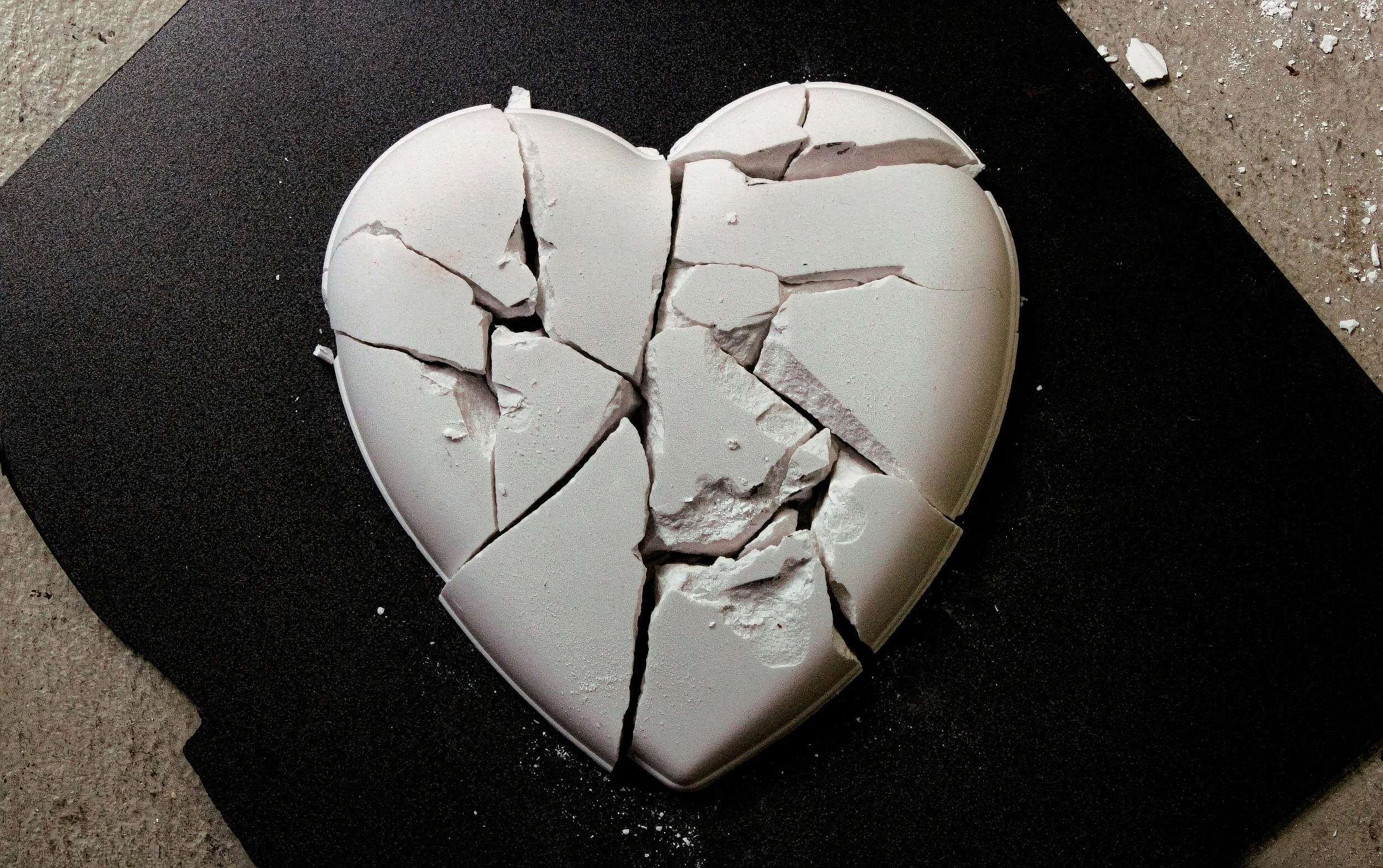Can Broken Trust Be Repaired? Here's How to Know
In my last post, we talked about how to spot trustworthy people - the 5 traits that let your nervous system relax and help you feel safe in relationships.
But here's the part that's harder to face: not everyone in your life is going to meet those standards. In fact, some of the people closest to you - family, long-time friends, even colleagues you've leaned on for years - may consistently fall short.
Photo by Marek Studzinski on Unsplash
And here's what most people don't realize: staying in relationships where trust is repeatedly broken doesn't just hurt in the moment - it trains your nervous system to expect betrayal, making it harder to trust anyone, including yourself.
For people-pleasers and high-achievers, this is especially painful. You've likely spent years smoothing things over, taking more than your share of responsibility, or convincing yourself the relationship is "fine." But deep down, you feel it: trust has been broken, and you don't know what to do next.
Why People-Pleasers Struggle to Rebuild Trust in Relationships
Prefer to watch? I break down how to know if broken trust can actually be repaired in this video.
If you've spent years people-pleasing, repairing broken trust can feel extra complicated.
Here’s why:
You might blame yourself first, even when you weren't the one who crossed the line.
You might over-function in the repair, apologizing excessively or working harder than the other person to "make things okay."
You might minimize the breach, convincing yourself it's "not that big a deal" to avoid conflict. Like when your sister shares something you told her in confidence, and you tell yourself "she didn't mean it that way" instead of addressing how exposed you felt.
Or you might cling to potential, hoping that if you're just patient or helpful enough, the other person will eventually change.
The result? You stay stuck in unbalanced relationships where trust never actually gets rebuilt because you're doing all the work.
If you're wondering whether someone in your life is actually trustworthy or just benefiting from your people-pleasing patterns, use this 5-point checklist to find out.
Feeling stuck in this pattern? You don't have to figure this out alone. In therapy, we can untangle these dynamics together and help you see clearly what's worth repairing - and what's asking too much of you. Schedule a free 20-minute consultation to explore whether we're a good fit.
How to Repair Broken Trust: Guidance from a Pasadena Therapist
So I know this isn’t groundbreaking news, but repair really is possible. In fact, some of the strongest relationships go through all sorts of mistakes and challenges, but repair well when mistakes happen.
Healthy repair requires something specific - and as an ACT therapist, I help clients get clear on what that actually looks like.
Signs of Healthy Repair in Relationships
When trust can truly be rebuilt, you'll see these signs:
The other person takes responsibility without blaming, gaslighting, or deflecting.
They offer a genuine apology and make concrete changes to prevent repeat patterns.
Over time, their actions consistently match their words, rebuilding your sense of safety.
You feel a sense of relief and ease, rather than confusion or dread, when interacting with them.
Repair is often a slow process. But when responsibility and change are present, trust can regrow - sometimes stronger than before.
3 Questions to Decide If a Relationship Can Rebuild Trust
From an Acceptance and Commitment Therapy (ACT) perspective, rebuilding trust in relationships means seeing clearly what’s happening and making choices guided by your values, not pressure or wishful thinking.
Ask yourself:
Is this person taking ownership, or am I doing all the emotional labor?
Notice if you're the only one initiating difficult conversations, naming the problem, or suggesting solutions. Healthy repair is a shared effort.Are their actions moving toward my values - or away from them?
In ACT, we look at whether behaviors align with what matters most. If someone says they value your trust but keeps breaking confidences, their actions tell the real story.When I imagine this relationship a year from now, do I feel expansion or contraction?
Tune into your body. Does thinking about staying in this relationship feel like relief and possibility? Or does it feel like bracing, shrinking, or resigned exhaustion?
💭 Pause here for a moment. If you just realized someone in your life keeps saying one thing but doing another, and you're tired of being the only one who sees it - I work with people navigating exactly this. Let's talk.
A Micro-Action You Can Take Today
Try this journaling prompt: Write about one relationship where trust feels shaky. Complete these sentences:
"The specific behavior that broke my trust was..."
"When I think about bringing this up, I feel..."
"If this relationship were truly repaired, it would look like..."
"My gut tells me this person is/isn't willing to do that work because..."
Getting honest about what broke your trust and how your body responds to that relationship is a powerful first step. It gives you clarity - and with clarity comes choice.
💛 If sorting through that feels heavy, therapy can give you support. Together, we can explore whether repair is possible, or if it’s time to protect your energy in new ways. Schedule a free consultation here.
Once you've worked through these questions, you might find clarity about whether this relationship can truly be repaired - or whether it's time to protect yourself differently. If you're leaning toward the latter, this post can help you navigate letting go.
When Rebuilding Trust Isn’t Working: Protecting Your Energy
So how do you know if you're in a relationship that's worth repairing - or one that's asking you to shrink yourself indefinitely?
Here’s the harder reality: not every relationship can be repaired.
Sometimes, no matter how many chances you give or how clearly you communicate, the other person won't take responsibility. They'll keep blaming, deflecting, or making you question your own reality.
For people-pleasers and high-achievers, this is where the spiral kicks in:
"Am I expecting too much?"
"Maybe I should just let it go."
"If I were a better partner/daughter/friend/colleague, this wouldn't bother me so much."
But here’s the truth: when trust keeps breaking without repair, that doesn’t mean you’re “too much.” It points to the other person’s unwillingness - or inability - to meet you with the respect and responsibility you deserve.
And that's when the next step is different than repair. It's choosing to set boundaries with family, friends, or colleagues - and protecting yourself in the process.
If you're at that point - knowing repair isn't happening but unsure how to move forward - I wrote about how to let go of someone who broke your trust without losing yourself.
Therapy for People-Pleasers and Executives in California & Nevada
Stuck wondering if you should keep trying or walk away?
If this is where you find yourself - unsure whether to keep trying or to finally step back - I’ve got you.
As a Pasadena therapist offering online therapy and holistic counseling across California and Nevada, I specialize in helping executives, high-achievers, and people-pleasers untangle these dynamics with clarity and compassion. Using Acceptance and Commitment Therapy (ACT), we'll help you see the patterns clearly and make decisions that honor your needs - without the guilt spiral.
Whether you're navigating broken trust at work, with family, or in friendships, therapy for executives and high-performers can give you the tools to stop over-functioning and start living in a connected way with your values.
Ready to stop second-guessing yourself?
If you're reading this and thinking "I need someone to help me see this clearly," that's exactly what I do. As a Pasadena therapist specializing in Acceptance and Commitment Therapy, I help executives and people-pleasers:
Stop over-functioning in relationships that drain them
Set boundaries without guilt
Make decisions based on their values, not fear or obligation
Ready to stop second-guessing yourself?
Book a free 20-minute consultation - we'll talk about what's going on and whether my approach is right for you. No pressure, no sales pitch, just a real conversation. Schedule here.
Not ready for therapy? Stay connected through my newsletter, where I share weekly tools, real-talk about boundaries and burnout, and gentle reminders that your needs matter, too.
💛 Check out my Substack!
FAQs About Rebuilding Trust in Relationships
Can broken trust ever fully heal?
Yes - when both people are willing to do the work. Healthy repair requires the person who broke trust to take responsibility, make consistent changes, and rebuild safety over time. It's not instant, but it's possible.
How long does it take to rebuild trust in a relationship?
There's no universal timeline, but genuine repair shows up in consistent patterns over weeks and months- not just one-time apologies. If you're not seeing behavioral change within a reasonable timeframe, that's important information.
What if I'm the only one who wants to repair the relationship?
This is a sign that repair may not be possible. Rebuilding trust requires mutual effort. If you're doing all the work, you're not repairing - you're maintaining an imbalanced dynamic.
Is it normal to still feel hurt even after someone apologizes?
Absolutely. A genuine apology is only the beginning of repair. Trust is rebuilt through consistent actions over time. It’s natural to still feel hurt, and your feelings are valid. Healing unfolds gradually, and it’s okay if it takes time.


